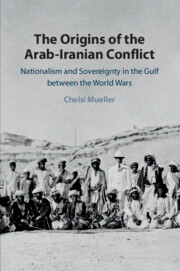
- Publisher:
- Cambridge University Press
- Online publication date:
- July 2020
- Print publication year:
- 2020
- Online ISBN:
- 9781108773881
Our systems are now restored following recent technical disruption, and we’re working hard to catch up on publishing. We apologise for the inconvenience caused. Find out more: https://www.cambridge.org/universitypress/about-us/news-and-blogs/cambridge-university-press-publishing-update-following-technical-disruption

The interwar period marked a transition from a Gulf society characterized by symbiosis and interdependency to a sub-region characterized by national divisions, sectarian suspicions, rivalries and political tension. In this study, Chelsi Mueller tells the story of a formative period in the Gulf, examining the triangular relationship between Iran, Britain and the Gulf Arab shaykhdoms. By doing so Mueller reveals how the revival of Iranian national ambitions in the Gulf had a significant effect on the dense web of Arab-Iranian relations during the interwar period. Shedding new light on our current understanding of the present-day Arab-Iranian conflict, this study, which pays particular attention to Bahrain and the Trucial states (United Arab Emirates), fills a significant gap in the literature on the history of Arab-Iranian relations in the Gulf and Iran's Persian Gulf policy during the Reza Shah period.
'This timely and thought-provoking book analyzes the roots and underlying sources of tension between the Arab (Arabian) and Iranian communities of the Persian Gulf. Mueller gives voice to dissenting narratives that shed light on the ways in which Iran’s nation-building projects alienated its ethnic Arab citizens and also affected its relations with neighboring communities. This work is an important and welcome addition to the growing historiography of the Persian Gulf.'
Firoozeh Kashani-Sabet - Walter H. Annenberg Professor of History, University of Pennsylvania
'An outstanding treatment that shows how events in the Persian Gulf in the interwar period, and especially the British role there, form the backdrop to present-day relations and security dilemmas between Arabs and Persians. The author has consulted a remarkable range of sources, many not used before, and has produced a balanced and important work on a key transitional period.'
Lawrence G. Potter - School of International and Public Affairs, Columbia University
‘Mueller's research is meticulous and innovative, with impressive use of Persian and Arabic sources, and her book is well structured and clearly written.’
B. Tavakolian Source: Choice
 Loading metrics...
Loading metrics...
* Views captured on Cambridge Core between #date#. This data will be updated every 24 hours.
Usage data cannot currently be displayed.